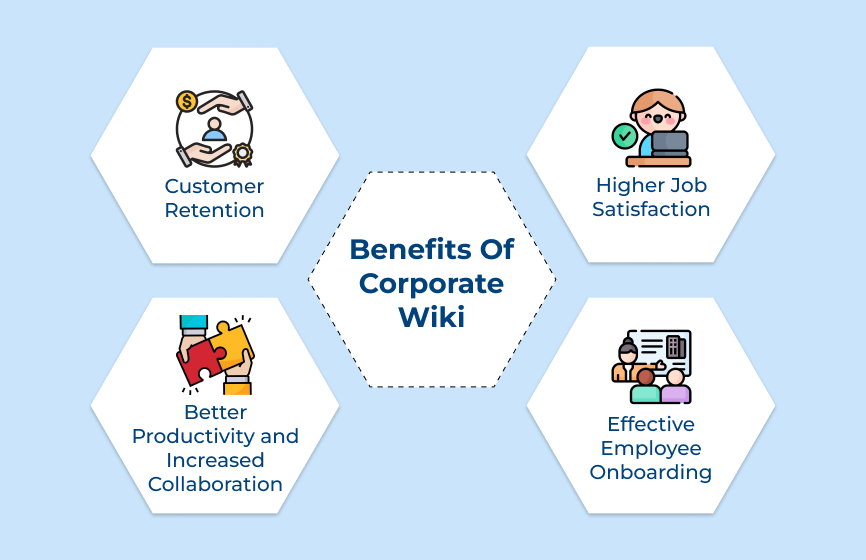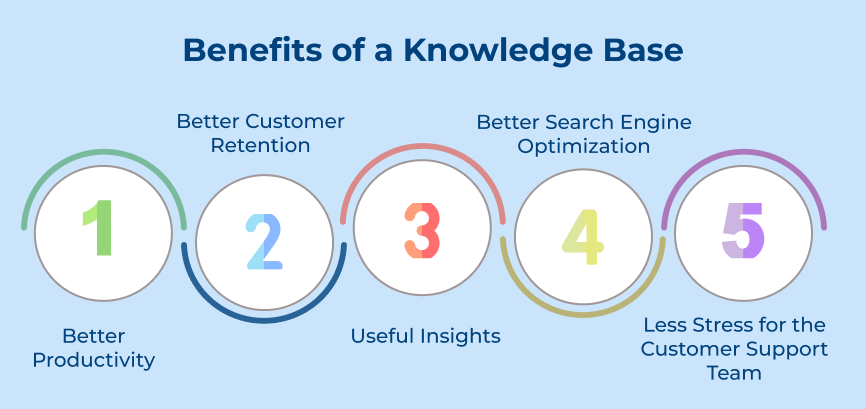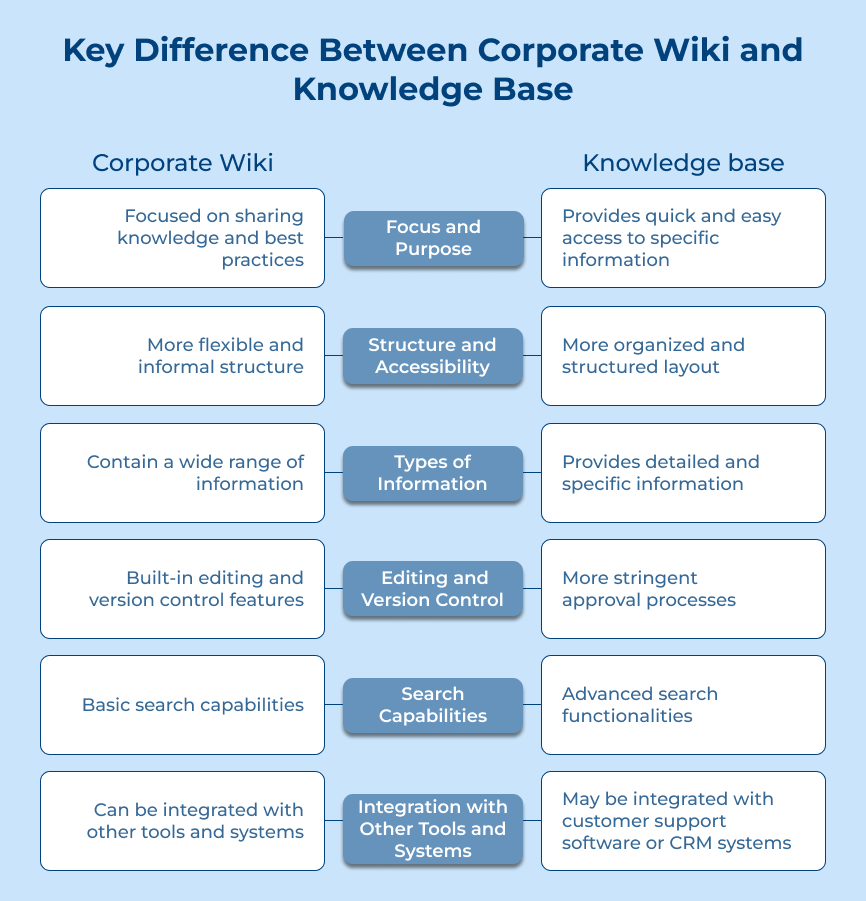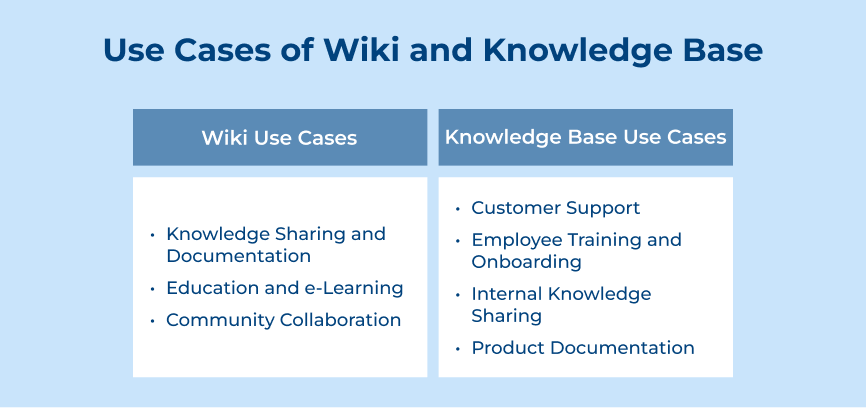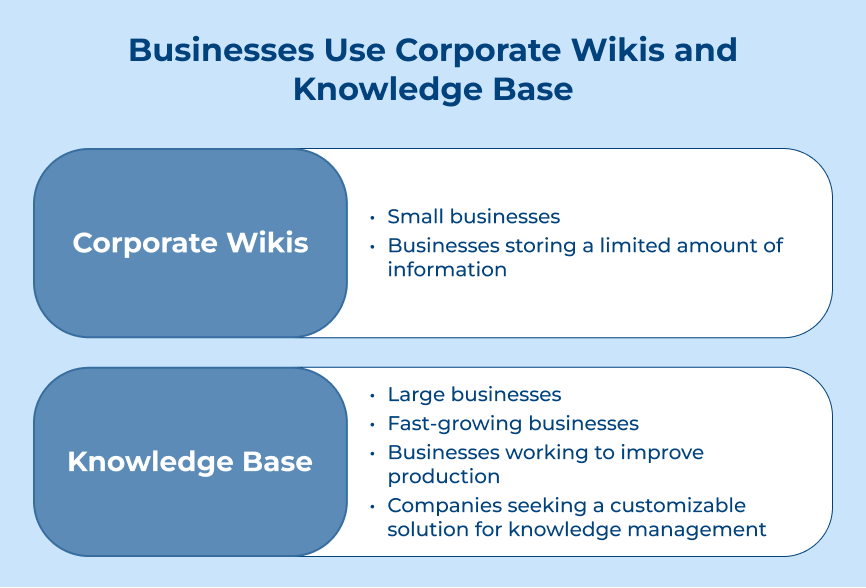1. Focus and Purpose
A corporate wiki focuses on creating collective intelligence within the organization. Its purpose is to create a repository of information that is continuously evolving through contributions from staff members. The system encourages employees to actively participate in the generation and dissemination of knowledge. It also promotes a sense of ownership and collaboration.
A knowledge base is a more structured and formalized platform. Its main focus is on organizing relevant knowledge for easy access and retrieval. The purpose of a knowledge base is to provide a centralized single source of reliable information, often in the form of articles and FAQs. Employees or customers can access this information to find answers or solutions to common queries or problems.
Key takeaways:
- A corporate wiki is ideal if the primary objective is to encourage collaboration, employee engagement and create a dynamic repository of knowledge. It promotes constant learning and information sharing among employees.
- If the main goal is to provide efficient and accurate information to employees or customers, a knowledge base is more suitable. An organization’s specific needs and objectives decide the choice between a corporate wiki and a knowledge base.
2. Structure and Accessibility
Corporate wikis are designed to be collaborative platforms where employees can create, edit and update content collectively. They often have a more flexible and organic structure. It allows constant evolution as new information is added. The systems typically prioritize open access, inviting all employees to contribute and access content.
Knowledge bases follow a more rigid and hierarchical structure. The information is organized into categories or subcategories for easier navigation and retrieval. They often have access restrictions, with certain information limited to specific roles or departments. The controlled accessibility helps ensure data protection and confidentiality.
Key takeaways:
- Corporate wikis are ideal for dynamic environments where information rapidly evolves. They promote collaboration and encourage employees to contribute their expertise. While knowledge bases excel in situations where structured information retrieval is critical.
- Corporate wikis promote openness and inclusivity. They allow all employees to access and contribute information. The approach encourages a culture of shared knowledge and collaboration. Knowledge bases offer heightened security measures. They ensure that sensitive information is only accessible to authorized individuals.
3. Types of Information
A corporate wiki is a collaborative website that allows users to contribute and modify content. It is typically used to store and share knowledge among employees. The information in a corporate Internal wiki can vary widely. It ranges from company policies or procedures to project documentation and best practices. The key characteristic of a wiki is its openness to editing. They enable continuous improvement and updating of content.
A knowledge base is a centralized database that stores structured information for easy access and retrieval. It is primarily used for customer support purposes. The database contains frequently asked questions (FAQs), product documentation and other relevant information. Unlike a company wiki, a knowledge base is usually managed by a select group of experts to ensure the accuracy and consistency of information.
Key takeaways:
- If the organization’s goal is to promote collaboration, encourage knowledge sharing and document best practices, a Corporate Wiki is a better choice. It allows employees to contribute and build a collective knowledge base.
- A Knowledge base is more appropriate if the primary objective is to provide customers or employees with easily accessible and solution-oriented information. Its structured format along with a focus on FAQs and troubleshooting guides make it an efficient tool for addressing specific queries.
4. Editing and Version Control:
A corporate wiki supports multiple users to edit and contribute to the content simultaneously. The tool promotes collaboration and encourages input from different team members. Every edit creates a new version of the page that allows for easy tracking and retrieval of previous versions. It is particularly useful when multiple changes need to be made to a piece of content over time.
A knowledge base follows a strict hierarchical structure where only authorized editors can make changes. The approach ensures centralized control over the information. The system usually retains a single version of each article or document. It simplifies the management process but can make it more challenging to trace changes or revert to previous versions.
Key takeaways:
- Corporate wikis may allow for real-time updates of various pages. It is suitable for projects that require constant updates and input from multiple team members.
- A knowledge base may be more suitable for organizations that prioritize centralized control and a more streamlined, single-version approach.
5. Corporate Wiki Search Capabilities
A corporate wiki functions as a collaborative platform. It allows employees to create, edit and update content collectively. While they offer a search feature, it is often limited to basic keyword searches. The users might encounter difficulties when searching for specific information if the wiki lacks proper organization or tagging practices.
A knowledge base is designed to provide structured and easily searchable information. It utilizes advanced corporate wiki search capabilities, such as filtering options, category-based searches and advanced indexing. Users can quickly locate relevant content, even if they are looking for specific details within a document or article.
Key takeaways:
- Knowledge bases excel in providing efficient and accurate search results due to their advanced search functionalities. Users can easily locate the precise information they need. It saves valuable time and increases productivity.
- The system is a better option if an organization deals with a vast amount of information or requires complex search capabilities. Its robust search features accommodate complex queries and facilitate efficient data retrieval, even as the knowledge base grows over time.
6. Integration with Other Tools and Systems
When it comes to integration with other tools and systems, a traditional wiki offers more flexibility. It can be easily integrated with different software applications, such as project management tools, customer relationship management (CRM) systems or even enterprise social networking platforms. It allows for seamless collaboration and sharing of knowledge across various platforms.
A knowledge base typically has limited integration capabilities. It often operates as a standalone system. The system can provide information and resources to users without the ability to connect with other tools or systems. It may hinder the flow of knowledge and collaboration across different platforms but it is sufficient for basic information retrieval.
Key takeaways:
- A corporate wiki offers more flexibility in integrating with various tools and systems. It offers enhanced collaboration and knowledge sharing across different platforms.
- A knowledge base typically operates as a standalone system. It provides information without the ability to integrate with other tools or systems. It may limit collaboration and hinder the flow of knowledge across different platforms but it can serve as a centralized repository.
What are the Use Cases of Wiki and Knowledge Base?
In this article, we will explore the various use cases of wikis and knowledge bases, highlighting their transformative potential in improving organizational efficiency and communication.






